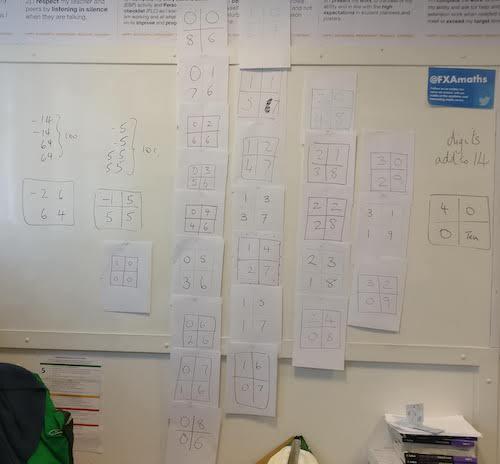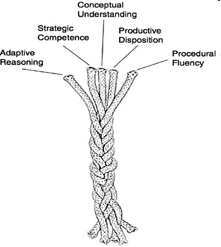A partnership between Felixstowe Academy, Felixstowe Primary Schools, NRICH and Trinity College, University of Cambridge
This exciting project aims to strengthen mathematics teaching and learning during the key transition years between primary to secondary education. Research consistently highlights the urgent need for action to address concerns relating to transition issues. In response, we have established this local network of schools to support effective transition approaches.
The NRICH team is leading this project as part of a wider collaboration with Felixstowe Academy and Trinity College, Cambridge. We are very grateful to Trinity College for its generous support of this project.
Year 4 of the project, 2020-2021
Face-to-face teacher days and masterclasses have been suspended due to the Covid pandemic, but we hope to restart these soon.
On 7 July 2021, Charlie and Liz ran a third Year 5 webinar for our partnership Felixstowe Primary Schools (which around 100 pupils attended). We worked on Daisy and then drew attention to the challenges that NRICH will be offering throughout the summer break. Each weekday from 19 July to 31 August, a new game or puzzle will appear on this Primary page and this Secondary page.
You can see a recording of the July webinar below:
On 18 May 2021, Charlie and Liz ran a second Year 5 webinar for our partnership Felixstowe Primary Schools (which around 75 pupils attended, including a Year 7 class from Felixstowe Academy). We worked on Magic Vs and drew attention to Magic Letters as a possible follow-up. You can see a recording of this webinar below:
On 17 March 2021, Charlie and Liz ran the first Year 5 webinar for our partnership Felixstowe Primary Schools (which more than 100 pupils attended). We worked on Dozens. You can see a recording of this webinar below:
In early December 2020, Charlie and Liz met online with some teachers to consider next steps for the project and make tentative plans for the future.
Year 3 of the project, 2019-2020
Third Day - provisionally scheduled for 24 June in Cambridge
To help make the transition from Primary to Secondary school as smooth as possible, Mandy Button (from Felixstowe Academy) has requested that all Year 6 students have a go at the following three problems during the summer term:
Triangles in Circles
Doughnut Percents
Curious Number
Mandy has selected suitable follow-up problems for the students to have a go at, at the start of Year 7.
Second Day (28 Jan 2020)
Building our Transition Curriculum Map - starting with Number
Getting started
Here's our solution to Reach 100 (we allowed repeated digits and zeros):

Requiring fluency, reasoning and problem solving.
Over to you...
Split into three groups according to first three tabs of the Primary Curriculum Map:
Group 1: Number and Place Value tab
Group 2: Addition and Subtraction tab
Group 3: Mental Calculation, Written Calculation, Inverse Operations from Multiplication, Division and Ratio tab
Suggest where the problems should go in our Y5-8 curriculum map by referring to the Secondary Curriculum Map
Time for sharing...
We looked at Six Numbered Cubes together
Here is our Year 5-8 Curriculum Map so far
Suggested reading:
EEF's Improving Mathematics in Key Stages 2 and 3 - (perhaps the poster summary educationendowmentfoundation.org.uk/public/files/Publications/Maths/EEF_-_Maths_KS2_KS3_Guidance_A3_Recs_Poster.pdf is most useful)
Angles Maths Hub's Improving Maths in Key Stages 2 and 3 (offers practical advice on using the EEF document)
Working Systematically
School Fair Necklaces
Nine-pin Triangles
Finding Fifteen
For more primary tasks, see our Working Systematically feature, as well as our KS1 and KS2 Finding All Possibilities collections.
Odds and Evens
Two's Company
Cosy Corner
These three problems will be live in the new feature to be published on the 17 October: Getting started, getting stuck
Year 2 of the Project, 2018-19
Third day:
Paired Activities - Year 6 into Year 7
Factor Lines
Always, Sometimes or Never?
Dozens
Diagonal Sums
Crossed Ends
Name that Triangle
Estimating Angles
Triangles in Circles
Dicey Perimeter, Dicey Area
Perimeter Challenge
Second day:
Shifting times tables
1. Shifting Times Tables / Times Tables Shifts
2. Light the Lights Again and Charlie's Delightful Machine and A Little Light Thinking
3. Seven Squares
We also mentioned the following two articles that may be of interest:
Train Spotters' Paradise
Dave Hewitt alerts us to 'the richness that can be gained by looking at a particular situation in some depth, rather than looking at it superficially in order to get a result for a table and then rushing on to the next example'.
An Exploratory Approach
Kenneth Ruthven outlines a three-part approach to the teaching and learning of mathematics (exploration, codification, consolidation).
Please try out at least one of the tasks above with your students, and come back on 24 June prepared to share your experiences. You may also wish to try:
Remainders and The Remainders Game
First day:
Multiplicative Reasoning
Slides
Mixing Lemonade to compare strategies. Followed up with sheet in the Teachers' Resources.
Moved on to sheets of short problems/primary tasks, to be tackled in 'chunks':
Flapjack
Heads and Feet
Punky Fish
Stamp Collecting
Zios and Zepts
Roses and Carnations
Printer Ink
Pairing Up
Stair Climb
A Leg to Stand On
For each group of problems, we considered these key questions:
- What strategies have you used?
- Which strategies are most elegant / effective?
- How can we move students on to use the most effective strategies?
Moved on to Through the Window and Warmsnug Double Glazing
Finished with some fluency exercises that recognised that time may need to be spent getting students up to speed:
Dicey Operations in Line &/or Dicey Operations - Games 3 & 4
Missing Multipliers
Gabriel's Problem
Article by Mike Askew:
Multiplicative reasoning: teaching primary pupils in ways that focus on functional relations
Year 1 of the Project, 2017-18
Third day:
Factors and Multiples Puzzle
Twenty Divided into Six
Which Scripts?
Number Lines in Disguise
Four Triangles Puzzle
Live Primary Problems
Live Secondary Problems
Second day:
Make 37
What Numbers Can We Make?
Coded Hundred Square
What's it Worth?
Sealed Solution (please try with your classes using the "Graffiti Maths" approach)
And if time allows...

First day:
Collections of Short Problems linked to the Secondary Curriculum.
Posters for the classroom.
"... I would hope that all children could experience at a few moments in their careers ... the power and excitement of mathematics ... so that at the end of their formal education they at least know what it is like and whether it is an activity that has a place in their future."
David Wheeler
